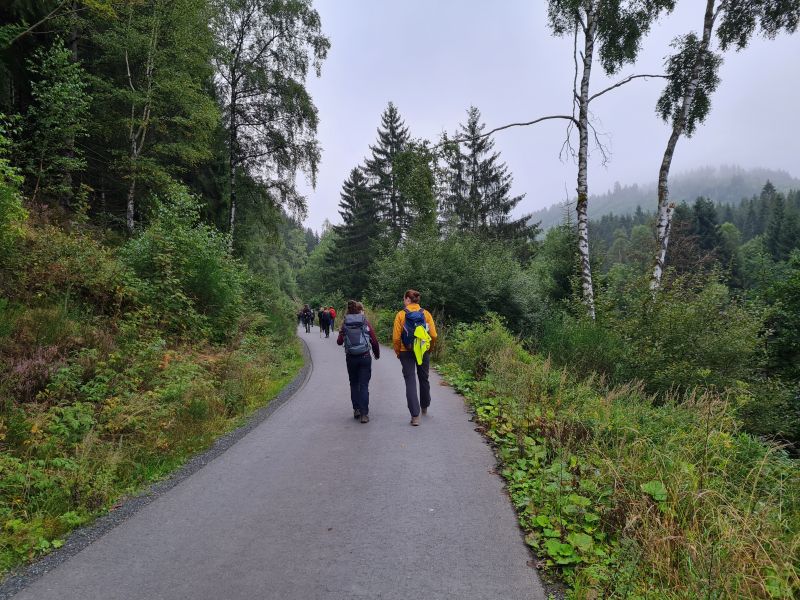
Lehre
BSc-Studium
Geländepraktikum in Eigenregie (Ergänzungsmodul)
Dozentin: Dr. S. Wassmann
Ziel dieses Kurses ist es, Student*innen die Möglichkeit zu geben, zeitlich flexibel und eigenständig Geländeerfahrung zu sammeln.
Die Student*innen finden sich in Zweiergruppen (2 Geländetage) oder Vierergruppen (4 Geländetage) zusammen und erarbeitet gemeinsam mit der Dozentin Ziele und Fragestellung für die Geländearbeit. Anschließend wird die Geländearbeit eigenständig geplant (Literaturrecherche) und durchgeführt. Der Bericht erfolgt in Form einer Moodle-gestützten Virtual Tour. Andere am Geländekurs teilnehmenden Zweier- und Vierergruppen werden ihren Kommiliton*innen mit Hilfe des Moodle Tools Peer Review konstruktives Feedback zu deren Virtual Tour geben.
Die Dozentin begleitet die Gruppen von der Planung an bis zum abschließenden Peer Review. Benotet wird die Gesamtleistung bestehend aus Planung, Durchführung, Virtual Tour und Feedback.
Geländepraktikum 2 Tage: 3 CP, Vorlesungsnr. 176556
Geländepraktikum 4 Tage: 6 CP, Vorlesungsnr. 176555
6. Semester (SoSe), Ergänzungsmodul
Geländeübung Regionale Geologie (Harz) (Modul-Nr. 7: Rohstoffe und regionale Geologie)
Dozenten: Prof. A. Dziggel, Dr. S. Volante
Diese Geländeübung befasst sich mit der geologischen Entwicklung des Harzes vom Devon bis zum Perm. Es werden die wichtigsten Gesteinstypen und geologischen Ereignisse vorgestellt: Ablagerungsräume devonischer und karbonischer Sedimente und vulkanischer Gesteine, die variskische Gebirgsbildung, Intrusion des Brockengranits sowie basischer und ultrabasischer Gesteine, und die Transgression des Zechstein-Meeres.
Geologische Karten und Profile (Modul-Nr. 8: Methoden der Geländearbeit)
Dozent: Dr. S. Schuth
Die Vorlesung führt die Studierenden in die Nutzung und Interpretation von geologischen Karten ein. Die Studierenden lernen, Profile zu erstellen und aus zweidimensionalen Informationen ein dreidimensionales geologisches Bild zu entwickeln und die zeitliche Entwicklung eines Gebietes daraus abzuleiten. Darüber hinaus wird die Nutzung des Geologenkompasses vermittelt und die Auswertungsmethoden der damit gewonnenen Daten vorgestellt.
Ein erfolgreicher Abschluss (Klausur) ist für die Teilnahme am Kartierkurs 1 erforderlich.
Kartierkurs I (Modul-Nr. 8: Methoden der Geländearbeit)
Dozenten: Prof. A Dziggel, Dr. S. Volante
In diesem Modul erlernen die Studierenden, ein Gebiet geologisch zu kartieren und geologische Profile zu konstruieren. Dies beinhaltet u.a. die Positionsbestimmung im Gelände, die Erkennung und Bestimmung der Lagerung von Schichten und Störungen, die Darstellung der Befunde in einer geologischen Karte sowie die Aufnahme stratigraphischer Profile.
Rohstoffe und regionale Geologie (Modul-Nr. 7: Rohstoffe und regionale Geologie)
Dozentin: Prof. A. Dziggel
Diese Vorlesung führt die Studierenden in die Grundlagen der Lagerstättenkunde und regionalen Geologie ein. Die regionale Verbreitung, wirtschaftliche Bedeutung und Produktion von Rohstoffen in Deutschland werden auf Basis der geologischen Entwicklung Mitteleuropas zu unterschiedlichen Erdzeitaltern erläutert. Die wichtigsten Erzminerale und Gefüge sowie die Verwendung metallischer und nicht-metallischer Rohstoffe werden vorgestellt.
MSc-Studium
Field course (Module Field course in Tectonics and Resources)
Dozenten: Prof. A. Dziggel, Dr. S. Volante
The content and exact duration of the field course depend on the field area, which is variable each year (Scotland, South Africa, …). The aim of this field course is to train the student's field skills in tectonics and economic geology, and to combine theoretical knowledge with field observations. The field course may include small mapping projects and visits to open pit and underground mines.
Pre-field course seminar (Module Field course in Tectonics and Resources)
Dozentin: Prof. A. Dziggel
In this seminar, the students prepare presentations on various topics that are covered in the field course on tectonics and resources.
Metallic mineral deposits (Module Economic Geology II)
Dozentin: Prof. A. Dziggel
This course introduces the students to ore forming processes, genetic concepts and classifications of metallic mineral deposits. Conceptual difference between mineral resources and ore reserves and economic aspects are also covered. Magmatic(-hydrothermal) ore forming systems include ortho-magmatic deposits, deposits related to granites, Cu-porphyries, ore deposits in mid-ocean ridges and ophiolites. Hydrothermal ore-forming systems related to metamorphic processes as well as ore deposits in supergene and sedimentary settings are also discussed.
Non-metallic mineral deposits (Module Economic Geology II)
Dozentin: Prof. A. Dziggel
This course introduces the students into the formation of non-metallic mineral deposits, the use and properties of industrial minerals, earths and rocks, salt and gemstones (diamond only).
Petrochronology and phase equilibria modelling (Module: Multi-disciplinary approaches to investigate poly-deformed terrains)
Dozentin: Dr. S. Volante
This MSc module aims at utilizing a multi-disciplinary and multi-scales approach to study complex poly-deformed terrains. This includes the combination of petrographic and structural observations at different scales (i.e., macro, meso, micro) with petrochronological (time constraints) analysis and phase equilibrium modelling (pressure and temperature estimates) to reconstruct pressure–temperature–deformation–time evolutions of the investigates terrains and associate them with distinct tectonic environments. At the end of this module the students will be able to combine different sources of information to investigate complex tectono-metamorphic histories and summarize them in a short communication paper.
Petrological and structural analysis (Module: Multi-disciplinary approaches to investigate poly-deformed terrains)
Dozentin: Dr. S. Volante
This MSc module aims at utilizing a multi-disciplinary and multi-scales approach to study complex poly-deformed terrains. This includes the combination of petrographic and structural observations at different scales (i.e., macro, meso, micro) with petrochronological (time constraints) analysis and phase equilibrium modelling (pressure and temperature estimates) to reconstruct pressure–temperature–deformation–time evolutions of the investigates terrains and associate them with distinct tectonic environments. At the end of this module the students will be able to combine different sources of information to investigate complex tectono-metamorphic histories and summarize them in a short communication paper.
Research project on ore deposits (Module Economic Geology II)
Dozentin: Prof. A. Dziggel
This course encompasses the guided independent study of well-characterized hydrothermal ore deposits using hand specimens, thin- and polished sections and a range of whole rock and mineral-chemical data. This course introduces students to research-oriented learning and is aimed at preparing the students for their Master projects.
THERMOCALC course (Module Metamorphic Petrology)
Dozenten: Prof. A. Dziggel, Dr. S. Volante
In this course, the students learn how to construct pseudosections for complex model systems involving solid solutions, based on case studies in metabasic rocks.